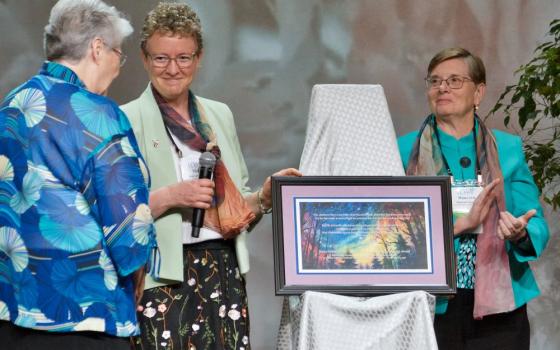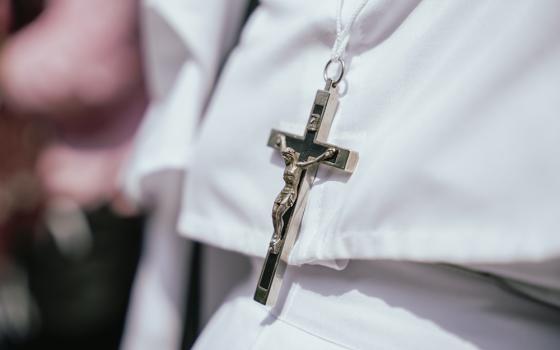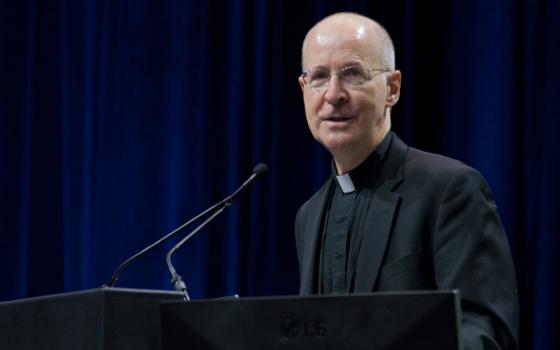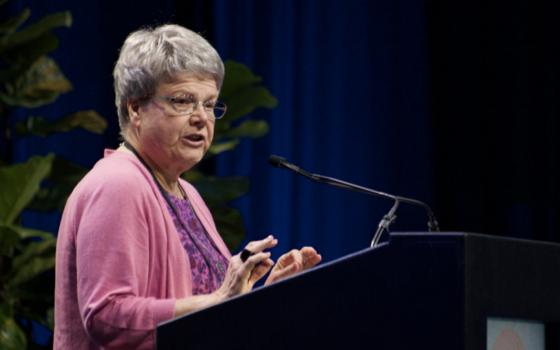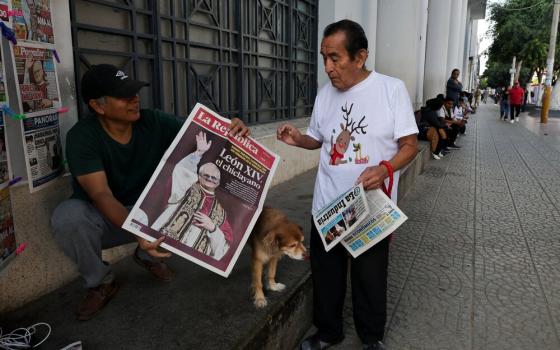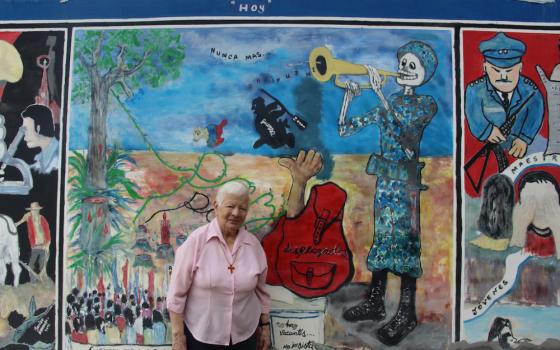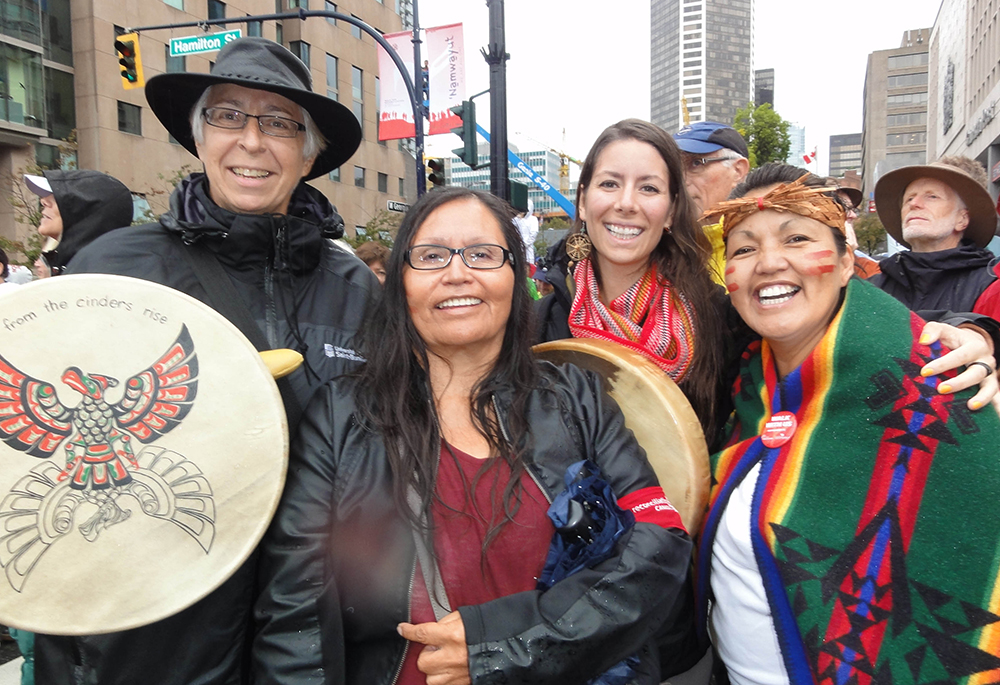
Sr. Norma McDonald, left, participates in a walk during the Truth and Reconciliation Committee in Vancouver 2013 with Nora Martin (Tla-o-qui-aht First Nation), Janelle Delorme (a réconciliACTION participant 2013) and Margaret Eaton (Tla-o-qui-aht First Nation). (Courtesy of Sr. Norma McDonald)
In the midst of wildfires and hurricanes, indictments and upcoming 2024 elections, it's been a summer filled with tragedy and uncertainty.
Amid this cacophony of catastrophes, Global Sisters Report continued to focus on stories that emphasized hope and ways forward that Catholic sisters are working to forge. We are taking a brief pause to remind you of stories and columns you may have missed this summer.
The long road to reconciliation
Pope Francis came to Canada in 2022 to apologize to Indigenous people for abusive residential schools. In the wake of his visit, Global Sisters Report looked into ongoing reconciliation efforts within religious communities and how sisters are working to rebuild a relationship with Canada's Indigenous peoples.
"It is uncomfortable, taboo almost, to talk about the pain sisters may feel around residential schools, especially when their congregations contributed to the suffering of thousands of children it had vowed to take care of," wrote Sandrine Rastello, who spent months working on the series. "In committing to reconciliation, sisters have had to come to terms with that overshadowing legacy."
"We were part of something that was damaging. Were we knowingly part of it? As far as we can figure out, we were not. Did we intend that? No, of course, we didn't intend it," said Sr. Marie Zarowny, president and board chair of the Sisters of St. Ann, which helped run four residential schools. "I'm not denying that it has been a struggle, and it continues to be a struggle for some sisters."
(We would be remiss to leave out national correspondent Dan Stockman's spring reporting on U.S. sisters helping compile a list of all boarding schools that Catholic entities ran from the 1820s to the 1960s.)
Sisters gather to talk women's equality in Rwanda
Africa correspondent Doreen Ajiambo was on the ground in July in Rwanda to attend the Women Deliver conference, one of the world's largest conferences focused on gender equality, health, and the rights and well-being of girls and women.

Sr. Rosemary Nyirumbe, a member of Sisters of the Sacred Heart of Jesus, and Sr. Josephine Anto, a member of the Society of the Holy Child Jesus, pose for a photo outside the arena where the Women Deliver 2023 Conference is taking place, July 17 in Kigali, Rwanda. (GSR photo/Doreen Ajiambo)
Religious sisters attending noted "that every day in every country, women and girls are discriminated against because of their gender," Ajiambo wrote. "The sisters said women and girls continue to face domestic and sexual violence and human trafficking and are denied the opportunity to access education, job opportunities, health care, and to lead." The sisters committed to fighting these issues.
"The sisters are women who are always on the ground; they never leave," said Sr. Gina Marie Blunck in one event. "For example, during the COVID-19 outbreak, the Catholic sisters remained when other humanitarian organizations left different countries. We realized, as Hilton, that if there are people who need to be supported to help others are sisters."
Ministries continuing in 'warlike' Haiti
The security and social situation in Haiti is as grave as it has ever been, said sisters, priests and humanitarian workers, who paint a grim picture of a country struggling amid gang domination that observers compare to terrorism, wrote international correspondent Chris Herlinger in August.
"We think of gangs like in New York City or Los Angeles — gangs fighting over whatever, but this has gone to a full on campaign of terror," said Jonathan LaMare, chief programs officer for the international nonprofit Mercy Beyond Borders, founded by Mercy Sr. Marilyn Lacey.
"The word 'hope' in Haiti right now," he said, "is a bit of a dangerous word."
Despite the considerable and daunting challenges, church-based ministries and humanitarian programs are continuing their work in the country.
Noting the ongoing needs caused by the lack of availability to food, Baltimore-based Catholic Relief Services told Global Sisters Report Aug. 3 in a statement that the organization and its local partners in Haiti "continue to focus on the lifesaving support to families who've been affected by the insecurity and violence, including providing cash so people can cover some of their needs, like food and other essentials."
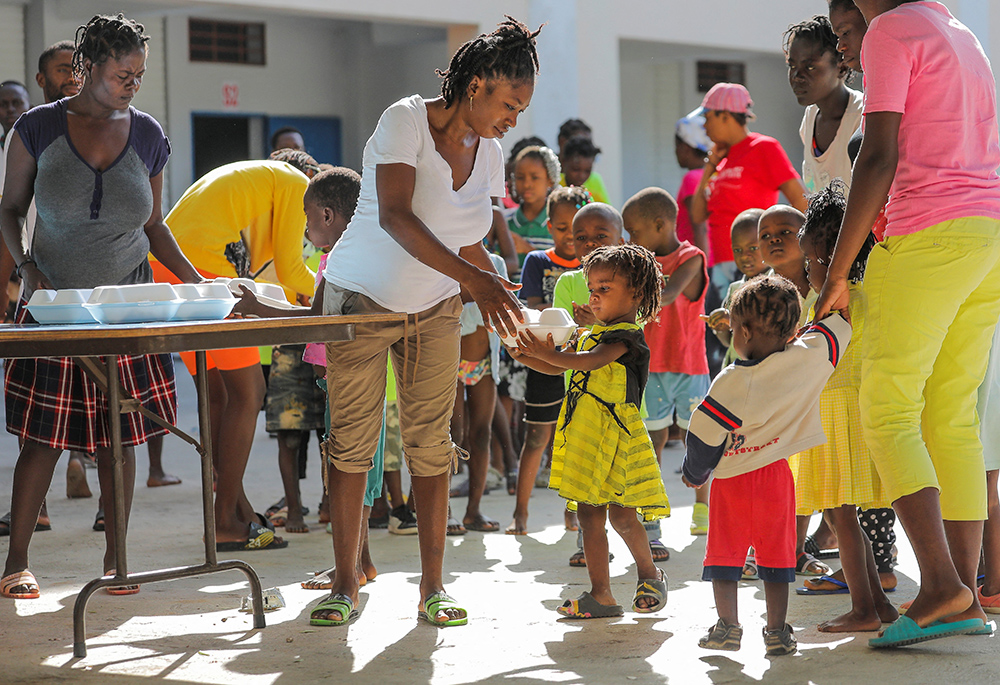
Haitian children who escaped violence in Cité Soleil line up to receive food at a school in Port-au-Prince July 22, 2022. An upsurge in gang-related violence has shut access to health services across some urban areas in Haiti, leaving one in 20 children living in Cité Soleil, a violence-ravaged commune, at risk of dying from severe acute malnutrition, UNICEF warned. (CNS/Reuters/Ralph Tedy Erol)
A vision of transformation and a 'new beginning'
The president of the Confederation of Latin American and Caribbean Religious encouraged women and men religious to go forward with renewed enthusiasm, compassion and greater joy amid multiple challenges, reported Latin America regional correspondent Rhina Guidos in June.
"The CLAR meeting included general secretaries and presidents of religious conferences from Latin America and the Caribbean, as well as consulting theologians, who spoke of new structures and systems, customs and practices to champion the mission of the church among the poor and vulnerable," wrote Guidos. "Their vision is one of transformation, where clericalism, personal interests and power-seeking are set aside."
Sr. Carol Zinn, executive director of the Leadership Conference of Women Religious, echoed those concerns, speaking about church life in the U.S., its brokenness and the country's polarization, and asking the participants to consider the possibility of a "new beginning" that would include groups of consecrated life from all corners of the Americas.
"It would be a mistake for me to not say something about my country," she said to the group. "I love my homeland and it is broken, as is the church. There's a lot of pain. There is a lot of injustice, a lot of suffering, which is political, economic, racial."
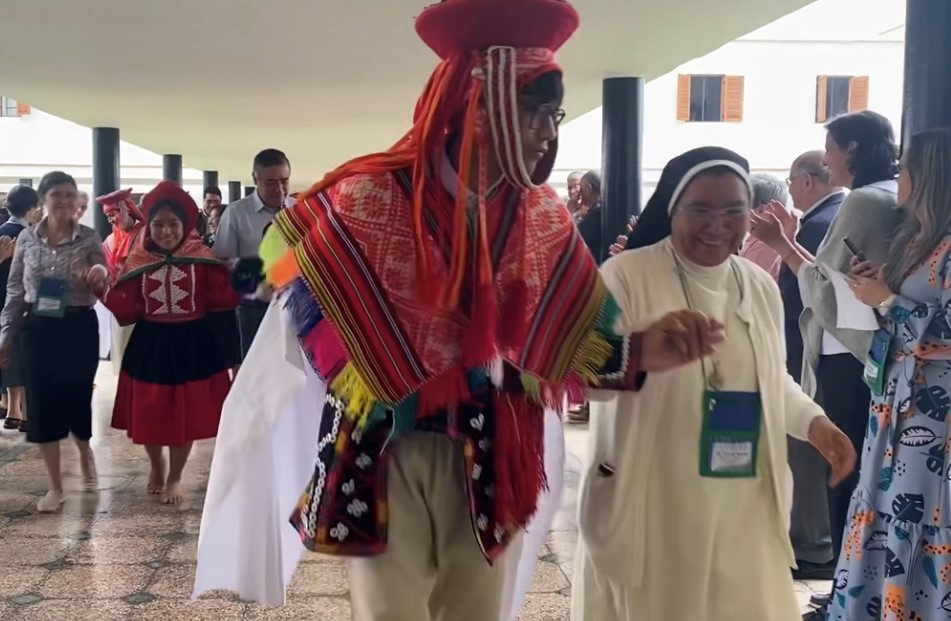
A dancer from the Fe y Alegria School escorts Sr. Silvia Flores, right, to the opening of the board meeting of the Confederation of Latin American and Caribbean Religious June 2, in Lima, Peru. Flores, of the Mercedaries of the Blessed Sacrament, took part in the four-day meeting about issues affecting consecrated life in the region attended by conference presidents and general secretaries of religious orders of Latin America and the Caribbean. (GSR photo/Rhina Guidos)
Sister columns at GSR en español
The only way to achieve a good and truly human life in a place like the Andes Mountains, far from the cities that have more resources, is the support and protection of the community, said Sr. Begoña Costillo in a column that was later published in GSR en español.
"The inhabitants of the Andean mountains know that the earth nourishes and protects the people, feeds them, shelters them from the cold and the sun, fills the soil with fruits and animals of all species, and sustains them with life," Costillo wrote.
And Sr. Lucía Aurora Herrerías Guerra writes about the values that her parents planted within her and her siblings: solidarity, a sense of justice and honesty.
"Throughout life, sometimes we follow in the footsteps and values of our parents; other times, we act 'against' them, and we distance ourselves from what they tried to instill in us," she said in the column, which was also posted in Spanish. "But siding with our parents or going against them, they are like the lighthouse that marks the harbor."
Advertisement
Seeing God in everything and everywhere
"In everything I do, wherever I find myself, I can create a peaceful atmosphere. … I try to be consciously aware of and dwell in God's presence in my daily encounters with myself, my sisters and brothers, and with all of creation."
Written by Sr. Teresa Anyabuike, this column focused on seeing the goodness of God all around us and is just one of the spiritual pieces written by sisters this summer.
Another powerful column, by Sr. Joan Sauro, tells the story of sitting by the bedside of her dying brother.
"Here I plead with Christ. 'Once you raised a little girl from the dead. Now I beg you to raise my brother Joseph from near death. After all, he bears your father's name,' " she said. "Here I keep begging, birds keep singing, my brother keeps sinking. Back to his bed with the five pillows. Keep, keep my brother alive, I pray."

